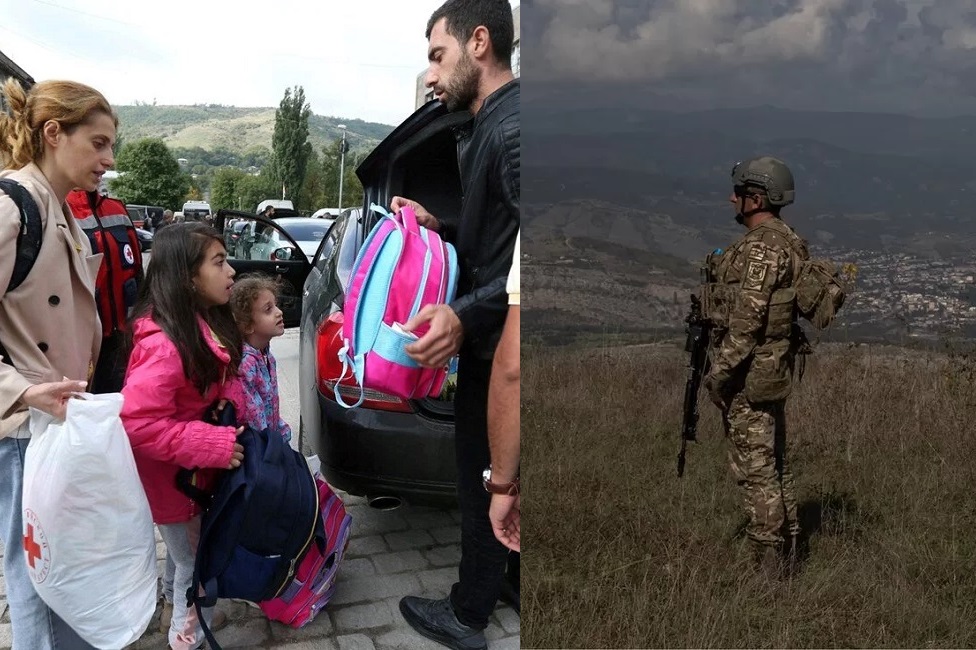
After a lightning-fast military operation on 19 September, Azerbaijan has regained full control over Karabakh and has put an end to Karabakh Armenians’ separatism that lasted for about 30 years.[1] The unrecognized separatist Armenian regime in Karabakh has announced that it will dissolve itself. Azerbaijan has indicated that it wants to reintegrate Karabakh Armenians as Azerbaijani citizens. In line with this, it has begun implementing a government program for such an integration, and is actively sending aid to the region and building infrastructure. Nevertheless, Armenian sources and news agencies report that nearly all of the 120,000 Karabakh Armenians have, out of fear for their safety, fled to Armenia. Azerbaijan has so far not released any official numbers on how many Armenians actually fled or how many Armenians were actually in Karabakh before the Azerbaijani military operation. There has reportedly been sporadic fighting between Azerbaijani security forces and some Armenian separatist fighters who have retreated into the mountainous terrain of Karabakh. In essence, Azerbaijan has achieved military victory over Karabakh, a territory that is internationally recognized as belonging to Azerbaijan. Narrative victory, however, remains elusive for Azerbaijan as the Armenian side and its traditional supporters are painting a starkly different picture of what is transpiring in Karabakh. This is being done in the hopes that Azerbaijan will be branded as committing “ethnic cleansing” by the international community and as a rogue state preying upon vulnerable people.
Armenia and its extensions among the Karabakh Armenians argue that Azerbaijan is engaging in ethnic cleansing by forcefully removing Karabakh Armenians from their ancestral homeland. Meanwhile, Diaspora Armenian organizations began declaiming from the moment Azerbaijan’s military operation started that Azerbaijan is perpetrating genocide against the Armenians (“Artsakh Genocide” or “Second Armenian Genocide”[2]). In a nutshell, the Armenian side argues that Azerbaijan can never be trusted to keep Karabakh Armenians safe or to treat them as equal Azerbaijani citizens because of the historical Armenian-Azerbaijani feud and because of the hatred of the “Muslim [Azerbaijan] Turks” against the “Christian Armenians”.
Türkiye, who has brotherly and allied relations with Azerbaijan, has also faced accusations, some of which are outright paranoid and Turcophobic. These include statements such as:
“It is difficult to understand Azerbaijani aggressivity without taking into consideration Turkey and massive Turkish military support. […] one gets the impression that Turkey did not forgive the Armenians for surviving a genocide it perpetrated during the First World War,”[3]
“Turkey is a genocidal society… Turkey has conducted so many genocides in history… Going back many centuries, it [Turkey] has been anti-Christian, and has tried to slaughter as many Christians as possible,”[4]
It would require a separate article to dissect the content of the accusations in these quotes, but it should suffice to state for now that, rather than accurately portraying either Azerbaijan or Türkiye, these accusations reflect the perverted, hateful, and discriminatory mindset of their authors. This mindset views the world in black and white, where Armenians can do no wrong and Turks are always specifically guilty of something that concerns Armenian interests.
Meanwhile, several Western countries and their supposedly independent media organs are engaging in an organized smear campaign against Azerbaijan (the United States and France[5] are at the forefront in this respect) in line with the Armenian discourse by employing improper contextualization, misleading titles, hearsay, and weasel words.[6] This is not surprising, since an analysis of the Karabakh Conflict of the past 30 years reveals that Western countries have traditionally backed, both overtly and covertly, a status quo that was in favor of Armenia and the Karabakh Armenians.
Since last year, Western countries have been aggressively courting Armenia in an attempt pull it out of Russia’s sphere of influence with the probable aim of opening a second front against Russia while it is bogged down in the Ukraine War. Additionally, as a strategically situated country, a West-aligned Armenia can serve as an obstacle against China’s ambitions to create trade routes through the South Caucasus to reach lucrative European markets. In line with all this, Azerbaijan is being scolded in the Western narrative for its “choice to attack [Karabakh] rather than pursue a Western-backed deal guaranteeing the civil rights of its Armenian minority”, which “means that Azerbaijan is guilty of ethnic cleansing.”[7]
The religion card is also being played via needless reminders that Armenians are Christians and Azerbaijani Turks are Muslims. The discourse used in this respect is on a spectrum from mild to extreme:
“Nagorno-Karabakh's ethnic Armenian authorities agreed […] to dissolve their government and allow the mainly Christian enclave to become a formal part of majority-Muslim Azerbaijan by the end of the year.”[8]
“As the Muslim nation of Azerbaijan resumed its genocide of Armenian Christians earlier this week, the question arises: When it comes to savage hate for ‘infidels,’ what, exactly, is the difference between Islamic terrorists — whom we are regularly admonished have nothing to do with real Islam — and Muslim statesmen?”[9]
Such reminders are needless, because a proper analysis of the Karabakh Conflict and Azerbaijan’s foreign policy indicates that the said conflict is essentially a land dispute based on opposing political narratives and that Azerbaijan makes no special emphasis on its Muslim-majority identity in its foreign policy (conversely, Armenia habitually emphasizes that it is the “first Christian nation” in the world). Furthermore, Azerbaijan has a vibrant Jewish community and close ties with Israel, indicating that Azerbaijan does not view religious differences as an excuse to discriminate. None of this is obscure information, meaning that the religion card is being shamelessly employed by Western actors to foster Christian solidarity and trigger emotional responses among Western audiences in support of Armenia.
In the face of all this, Azerbaijan has a different story to tell. Territorial integrity is one of the fundamental principles in the international system and Karabakh is internationally recognized as belonging to Azerbaijan (this has been recently admitted by Armenia as well). This means establishing full control over the region is an internal matter for Azerbaijan. So, the scolding Azerbaijan has received from Armenia and Western countries for its Karabakh military operation constitutes foreign meddling in violation of Azerbaijan’s state sovereignty and an attempt to internationalize the issue at hand.
The demographic balance of Karabakh needs clarification as well. The Armenian majority in Karabakh was the outcome of Tsarist Russia’s demographic engineering to use Armenians as a buffer against Turks in the Caucasus, meaning the Armenian narrative about Karabakh “belonging” to Armenians is highly inaccurate. In truth, Karabakh has historically been a multi-ethnic region. Meanwhile, the Azerbaijani population of Karabakh and hundreds of thousands of Azerbaijanis in the adjacent regions were mercilessly driven out by Armenian forces during the First Karabakh War. The 30-year Karabakh Conflict demonstrated that neither Armenia nor Western countries cared one bit about the plight of the Azerbaijani IDPs who, until 2020 when the Second Karabakh War changed the status quo, had no chance to return to their homes. The co-chairs of the OSCE Minsk Group (the US, France, and Russia), who were tasked with achieving a resolution to the Karabakh Conflict that would reflect both Armenian and Azerbaijani interests, utterly failed. The US and France were only interested in a status quo that would appease Armenia and solidify the position of the separatist Karabakh Armenians, while Russia was only interested in a status quo that would allow it to play Armenia and Azerbaijan against each other and solidify Russia’s position in the South Caucasus.
So, Azerbaijan wasted 30 years prior to 2020 in search for justice and a peaceful resolution to the Karabakh Conflict. Even when it gained the upper hand after the Second Karabakh War, Azerbaijan nevertheless pursued a diplomatic path by continuing to negotiate with both Armenia and Russia to establish a stable regional framework for South Caucasus. However, developments after 2020 demonstrated that Armenia and its backers on the one hand, and Russia on the other were again only interested in a status quo that would deprive Azerbaijan the chance to regain its occupied territory.[10] The mine explosions that killed two Azerbaijani civilians and four soldiers on 19 September seem to have been the straw that broke the camel’s back.[11] Azerbaijan was also most likely aware of the fact that Russia was too preoccupied with the ongoing Ukraine War and too angry with Armenia’s Nikol Pashinyan government to intervene, and that Pashinyan’s government had grown sick and tired of the years of burden exerted on Armenia by the delusions of the Armenian separatists in Karabakh.[12] The time had come for Azerbaijan to act; playing the diplomatic waiting game was jeopardizing its chance to finally regain its occupied territory.
As such, the narrative about Azerbaijan’s “choice to attack [Karabakh] rather than pursue a Western-backed deal guaranteeing the civil rights of its Armenian minority” is misleading. From Azerbaijan’s perspective, the said Western-backed deal turned out to be a dead-end, just like the OSCE Minsk Group process. The only realistic option left was to use its military power to regain Karabakh. Even when it did so, Azerbaijan only targeted separatist Armenian military units (obviously, the Armenian side alleges that Azerbaijan indiscriminately targeted civilians) when the easy thing to do would have been to use its superior firepower to bomb anything in its path. When Azerbaijan reached Khankendi, the main population center of Karabakh, it negotiated with Russian peacekeeping forces and the separatist Armenian administration to avoid civilian casualties. None of these considerations seem to matter for either Armenia or its Western backers.
The last important discussion point are the accusations of “ethnic cleansing” and “genocide”. The reported number of Armenians who fled Karabakh, and the statements of fleeing Armenians, Armenian officials, the United Nations (UN), and the International Committee of the Red Cross (ICRC) demonstrate that both accusations are based on fabrications.
The genocide accusation is easy to dismiss. Armenian sources themselves confirm that almost all the claimed 120,000 Karabakh Armenians have fled to Armenia[13] and international media is now reporting that Khankendi has basically turned into a ghost town.[14] If almost all the Karabakh Armenians have fled and Khankendi is not littered with bodies of deceased Armenians, who did Azerbaijan supposedly kill? The accusation of genocide in Karabakh thus has no basis in reality and is a demonstration of Armenian actors’ habitual abuse of the legally defined term genocide to generate public sympathy for Armenian interests.
Dismissing the ethnic cleansing accusation is a more complicated task. For the sake of honesty, it should be pointed out that the Karabakh Conflict solidified a hostility and suspicion between Armenians and Azerbaijanis that dates back to the times Tsarist Russia expanded its influence in the Caucasus. If given a choice, most Armenians and Azerbaijanis would probably choose to live separately from each other. Despite this, Azerbaijan nevertheless called upon Karabakh Armenians to stay[15] and become citizens. It distributed food and water to Armenians who were fleeing to Armenia or were unable to leave[16] and is actively sending aid to Karabakh.[17] Both the UN mission that recently visited Karabakh and the ICRC that is currently operating there have indicated that they so far have no records of mistreatment against the Armenians.[18] After days of indirectly smearing Azerbaijan’s name with biased reporting, Western media organs have finally begun to indicate that there are no known instances of Karabakh Armenian being forced by Azerbaijani officials or forces to leave Karabakh.[19]
As stated in the beginning, Azerbaijan has begun implementing a government program for Armenians’ integration and building infrastructure.[20] In parallel to this, the separatist Karabakh Armenian administration indicated in its dissolution decree that:
“After the entry into force of this decree, the population of Nagorno-Karabakh, including those located outside the republic, should consider the conditions of reintegration presented by the Republic of Azerbaijan in order to make an independent and individual decision on the possibility of staying (returning) to Nagorno-Karabakh in the future.”[21]
Nevertheless, Karabakh Armenians -citing fears for their security- began to immediately flee when the separatist Armenian forces surrendered to Azerbaijan. When asked why they were fleeing by Azerbaijani journalists, many Armenians indicated that they were either told by the local authorities (officials of the separatist Karabakh Armenian administration) or by the people around them that they should leave.[22] As this was unfolding, Armenia’s government confidently stated that no Armenian would be left in Karabakh in the coming days.[23] It therefore becomes apparent that Karabakh Armenians made the decision to leave Karabakh as a form of precaution, based on a combination of their historic dislike and distrust towards Azerbaijanis and the urging of Armenian officials, and not because they were being actively threated by Azerbaijan. Realistically speaking, could Azerbaijan have done anything in such a short time to dispel Karabakh Armenians’ hesitations? And if Armenians left Karabakh on their own volition, can it really be called ethnic cleansing?[24]
In essence, the battle to control the narrative over Karabakh revolves around two compelling points: Armenian civilian safety versus Azerbaijani state sovereignty. Given the history of animosity between Armenians and Azerbaijanis, Karabakh Armenians’ fears for their safety and justifications for fleeing Karabakh are understandable. This, however, should not serve as an excuse to dismiss Azerbaijanis’ long list complaints over the injustices they have had to endure in the last 30 years because of the Karabakh Conflict or their willingness to defend Azerbaijan’s sovereignty rights.
*Image: An Armenian family getting ready to flee Karabakh (left), an Azerbaijani soldier standing at an outpost overlooking the city of Khankendi (right) - Sources: NTV/BBC
[1] I would like to thank South Caucasus expert and former AVİM Analyst Tutku Dilaver for contributing to the formulation of the ideas contained in this article.
[2] Mark Movsesian, “The Second Armenian Genocide”, Compact, September 27, 2023, https://compactmag.com/article/the-second-armenian-genocide
[3] Vicken Cheterian, “Nagorno-Karabakh, The Death of a Rebel Republic”, Agos, September 22, 2023, https://www.agos.com.tr/en/article/29167/nagorno-karabakh-the-death-of-a-rebel-republic
[4] Raymond Ibrahim, “The Genocide of Christians: Islamic Terrorists vs. Muslim Statesmen”, The Stream, September 26, 2023, https://stream.org/the-genocide-of-christians-islamic-terrorists-vs-muslim-statesmen/
[5] Seda Sevencan, “Azerbaijan criticizes French foreign minister’s remarks against Baku”, Anadolu Agency, October 3, 2023, https://www.aa.com.tr/en/asia-pacific/azerbaijan-criticizes-french-foreign-minister-s-remarks-against-baku/3007144
[6] Examples of this have been detected in publications such as Newsweek, The Guardian, The Washington Post, Politico, The New York Times, BBC, Deutsche Welle, AFP, Reuters, and France 24.
[7] “A humanitarian disaster is under way in Nagorno-Karabakh”, The Economist, September 28, 2023, https://www.economist.com/leaders/2023/09/28/a-humanitarian-disaster-is-under-way-in-nagorno-karabakh
[8] “Baku denies Nagorno-Karabakh ethnic cleansing claims”, France 24, October 1, 2023, https://www.france24.com/en/live-news/20231001-baku-denies-nagorno-karabakh-ethnic-cleansing-claims
[9] Ibrahim, “The Genocide of Christians…”
[10] Mehmet Oğuzhan Tulun, “Discussions on Karabakh at the UNSC and its Repercussions in Some Circles”, Center for Eurasian Studies (AVİM), Commentary No: 2023/28, September 21, 2023, https://avim.org.tr/en/Yorum/DISCUSSIONS-ON-KARABAKH-AT-THE-UNSC-AND-ITS-REPERCUSSIONS-IN-SOME-CIRCLES
[11] Ruslan Rehimov, “Karabağ'da Ermeni güçlerin döşediği mayının patlaması sonucu 4 Azerbaycanlı polis şehit oldu”, Anadolu Ajansı, 19 Eylül 2023, https://www.aa.com.tr/tr/dunya/karabagda-ermeni-guclerin-dosedigi-mayinin-patlamasi-sonucu-4-azerbaycanli-polis-sehit-oldu/2995317 ; Ruslan Rehimov, Ali Cura, Emre Gürkan Abay, Yavuz Aydın, “Azerbaycan Savunma Bakanlığı: Karabağ'da antiterör operasyonu başlatıldı”, Anadolu Ajansı, 19 Eylül 2023, https://www.aa.com.tr/tr/dunya/azerbaycan-savunma-bakanligi-karabagda-antiteror-operasyonu-baslatildi/2995388
[12] Joseph Epstein, “How Nagorno Karabakh's Fall Could Help Armenia”, Newsweek, October 3, 2023, https://avim.org.tr/Blog/HOW-NAGORNO-KARABAKH-S-FALL-COULD-HELP-ARMENIA-NEWSWEEK-03-10-2023
[13] “No new arrivals from Nagorno-Karabakh, total number of forcibly displaced persons arriving in Armenia stands at 100,632”, News.am, October 4, 2023, https://news.am/eng/news/784994.html
[14] “UN team in Nagorno-Karabakh, a first in 30 years, as ethnic Armenians flee”, Al Jazeera, October 1, 2023, https://www.aljazeera.com/news/2023/10/1/un-team-in-nagorno-karabakh-a-first-in-30-years-as-ethnic-armenians-flee
[15] Andrew Osborn, “Azerbaijan says it does not want exodus from Nagorno-Karabakh, urges Armenians to stay”, Reuters, September 28, 2023, https://www.reuters.com/world/azerbaijan-says-it-does-not-want-exodus-nagorno-karabakh-urges-armenians-stay-2023-09-28/
[16] For example, please see: “Azərbaycan polisi erməni sakinlərə qida paylayır”, Operativ Media, Instagram page, September 28, 2023, https://www.instagram.com/reel/Cxp1Xwosd_i/ ; “Azerbaijani soldiers and doctors saved a 90-year-old Armenian woman in Karabakh.”, Clash Report, X (Twitter) page, September 27, 2023, https://x.com/clashreport/status/1707005336496857429?s=20
[17] Maryana Ahmadova, “Azerbaijan shares latest data on humanitarian aid delivered by central authorities to Karabakh Armenians”, Trend News Agency, October 3, 2023, https://en.trend.az/azerbaijan/politics/3806405.html
[18] “BM: Karabağ'dan Ermenistan'a gidenlere yönelik herhangi bir kötü muamele bildirilmedi”, NTV, 29 Eylül 2023, https://www.ntv.com.tr/dunya/bm-karabagdan-ermenistana-gidenlere-yonelik-herhangi-bir-kotu-muamele-bildirilmedi,Tj-dyiosZ0-qCNtebVvNUA ; “‘Ghost town with no soul’: Inside Karabakh after ethnic Armenians flee”, Al Jazeera, YouTube channel, October 2, 2023, https://youtu.be/axdKnZ4sYhA?si=-Ax1hep375bivimj
[19] Joel Gunter, “Deserted Nagorno-Karabakh reveals aftermath of lightning-fast Armenian defeat”, BBC, October 4, 2023, https://www.bbc.com/news/world-europe-66995976
[20] “Azerbaycan devlet kurumları, Karabağ'daki Ermeni nüfusa hizmet vermeye başladı”, NTV, 1 Ekim 2023, https://www.ntv.com.tr/dunya/azerbaycan-devlet-kurumlari-karabagdaki-ermeni-nufusa-hizmet-vermeye-basladi,z3Y7ELt65ECnqjYQ82riKA# ; “UN team in Nagorno-Karabakh…”, Al Jazeera.
[21] Elena Teslova, “Unrecognized Nagorno-Karabakh statelet to cease to exist by next Jan. 1”, Anadolu Agency, September 28, 2023, https://www.aa.com.tr/en/world/unrecognized-nagorno-karabakh-statelet-to-cease-to-exist-by-next-jan-1/3002766
[22] “Paytaxtda yaşamış Qarabağ ermənilərindən etiraflar: Bakıdan nəyi istədilər?”, AZTV, Instagram page, September 28, 2023, https://www.instagram.com/reel/CxuG8KcIO5T/
[23] “No Armenian will be left in Nagorno-Karabakh in coming days amid exodus – Pashinyan on Azeri ethnic cleansing campaign”, ArmenPress, September 28, 2023, https://armenpress.am/eng/news/1120708.html
[24] Gwynne Dyer, who believes a genocide took place against the Armenians in 1915, has nevertheless penned an interesting article criticizing the Armenian claims of ethnic cleansing and genocide in Karabakh. Here are some the highlights of his article: “Yet there’s something odd about the scene at the [Armenia-Azerbaijan] border-crossing point. [Karabakh Armenians] arrive in their own cars, piled high with their belongings, and claim that they have been ethnically cleansed, but they don’t tell tales of horror and there’s nobody chasing them. Indeed, the Azerbaijani government officially says that they are welcome to remain, and it has allowed a UN fact-finding mission in to see what has been happening in the enclave. There have been no credible reports of harm coming to Armenian residents of the breakaway republic since the 24-hour war ended in an Armenian defeat on 20 September. […] Thirty years of hot and cold war is bound to have made the ‘refugees’ nervous, but isn’t this mass exodus a bit premature? […] It’s not a lot to work with, but Pashinyan has to go with what he’s got, so he says ‘ethnic cleansing’ and leaves it to ‘useful idiots’ elsewhere (like [former prosecutor at the International Criminal Court Luis] Moreno Ocampo) to say ‘genocide’. But saying it doesn’t make it true. Something closer to the truth was voiced by David Babayan, an adviser to Samvel Shahramanyan, the erstwhile president of Nagorno-Karabakh. ‘Our people do not want to live as part of Azerbaijan. Ninety-nine point nine percent prefer to leave our historic lands.’ And so it has come to pass. […] And all the Armenians of Nagorno-Karabakh are leaving without even waiting to find out if the victors will keep their promise to treat them like any other Azerbaijani citizens. It’s not a genocide, but you could call it ethnic auto-cleansing.” Source: Gwynne Dyer, “Armenia: Not a Genocide”, The Portugal News, October 2, 2023, https://www.theportugalnews.com/news/2023-10-02/armenia-not-a-genocide/81904
© 2009-2025 Center for Eurasian Studies (AVİM) All Rights Reserved
No comments yet.
-
 THE BATTLE TO CONTROL THE NARRATIVE OVER KARABAKH: ARMENIAN CIVILIAN SAFETY VS. AZERBAIJANI STATE SOVEREIGNTY
THE BATTLE TO CONTROL THE NARRATIVE OVER KARABAKH: ARMENIAN CIVILIAN SAFETY VS. AZERBAIJANI STATE SOVEREIGNTY
Mehmet Oğuzhan TULUN 06.10.2023 -
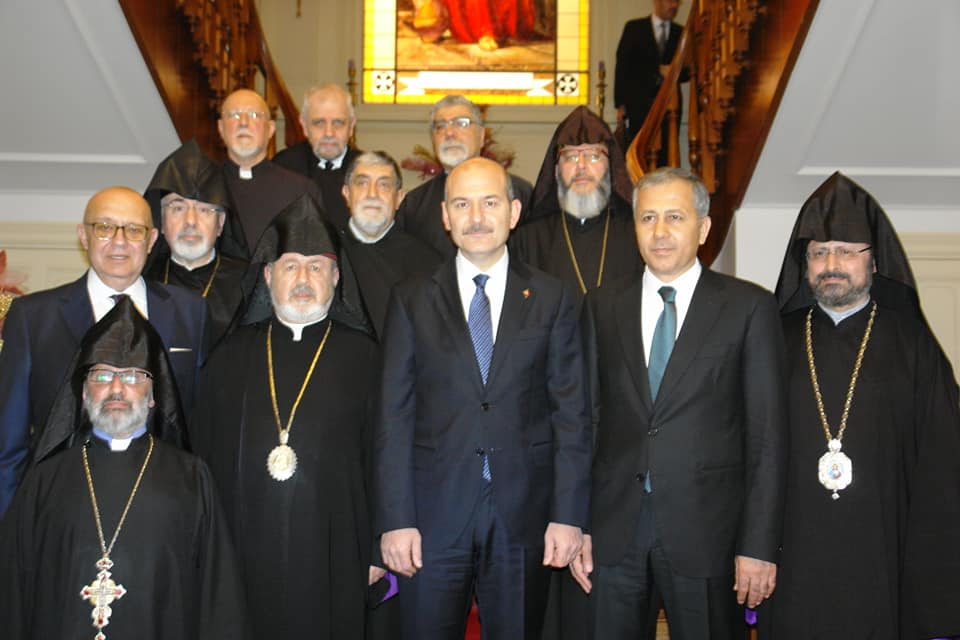 THE 2019 ARMENIAN PATRIARCH OF ISTANBUL ELECTION GUIDELINE AND RELATED DISPUTES
THE 2019 ARMENIAN PATRIARCH OF ISTANBUL ELECTION GUIDELINE AND RELATED DISPUTES
Mehmet Oğuzhan TULUN 21.11.2019 -
 SOME CRITICISMS REGARDING PROF. DR. ERIK-JAN ZÜRCHER’S CENTENNIAL STATEMENT
SOME CRITICISMS REGARDING PROF. DR. ERIK-JAN ZÜRCHER’S CENTENNIAL STATEMENT
Mehmet Oğuzhan TULUN 21.04.2015 -
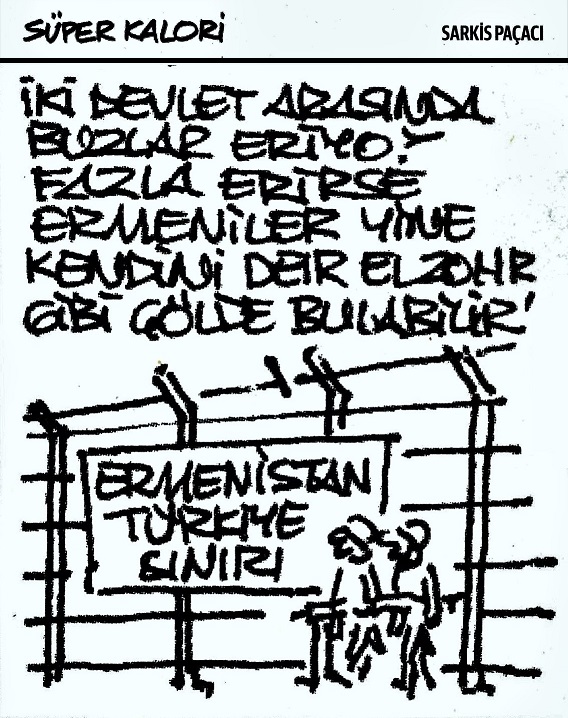 OPPOSITION AGAINST THE TURKEY-ARMENIA NORMALIZATION PROCESS THROUGH THE USE OF CARTOONS
OPPOSITION AGAINST THE TURKEY-ARMENIA NORMALIZATION PROCESS THROUGH THE USE OF CARTOONS
Mehmet Oğuzhan TULUN 13.05.2022 -
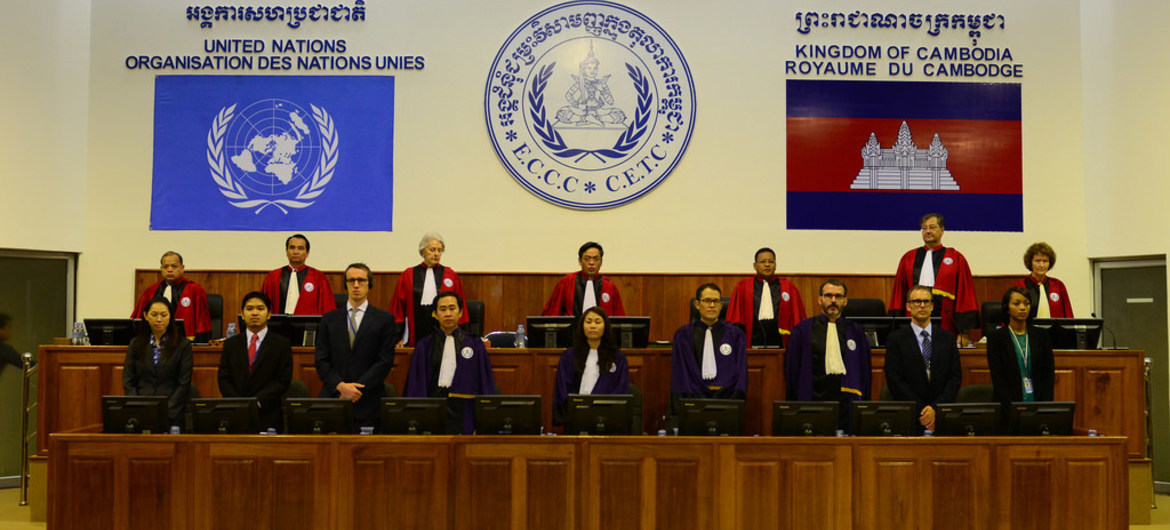 THE GENOCIDE VERDICT OF THE UN BACKED CAMBODIA COURT AND THE 1915 EVENTS
THE GENOCIDE VERDICT OF THE UN BACKED CAMBODIA COURT AND THE 1915 EVENTS
Mehmet Oğuzhan TULUN 30.11.2018
-
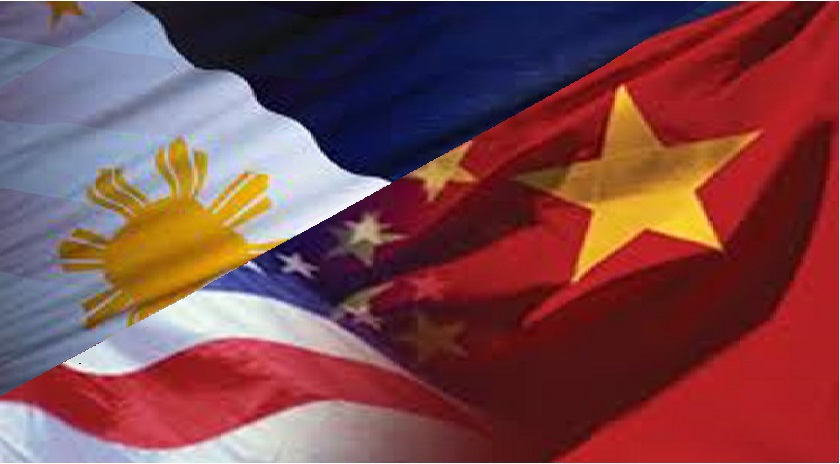 SOUL-SEARCHING IN SOUTHEAST ASIA: EMERGING RIFTS BETWEEN OLD FRIENDS AND NEW FOREIGN POLICY DIRECTIONS
SOUL-SEARCHING IN SOUTHEAST ASIA: EMERGING RIFTS BETWEEN OLD FRIENDS AND NEW FOREIGN POLICY DIRECTIONS
Teoman Ertuğrul TULUN 17.01.2017 -
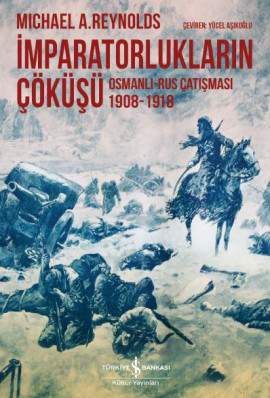 BOOK REVIEW: SHATTERING EMPIRES. THE CLASH AND COLLAPSE OF THE OTTOMAN AND RUSSIAN EMPIRES 1908–1918”
BOOK REVIEW: SHATTERING EMPIRES. THE CLASH AND COLLAPSE OF THE OTTOMAN AND RUSSIAN EMPIRES 1908–1918”
Nigar SHİRALİZADE 24.09.2018 -
 THE RISING STRATEGIC IMPORTANCE OF TÜRKIYE'S MIDDLE CORRIDOR IN EURASIA AMID THE UKRAINE CONFLICT
THE RISING STRATEGIC IMPORTANCE OF TÜRKIYE'S MIDDLE CORRIDOR IN EURASIA AMID THE UKRAINE CONFLICT
Teoman Ertuğrul TULUN 29.05.2024 -
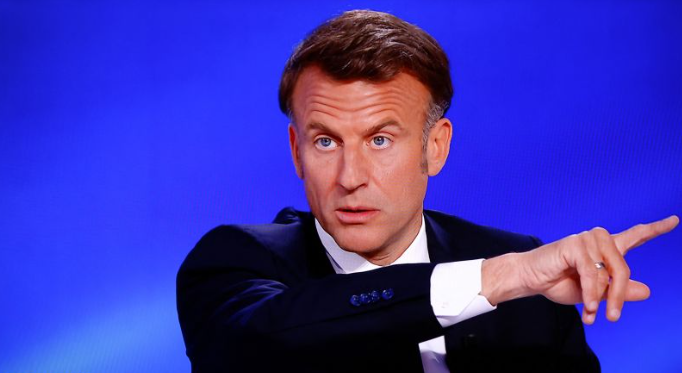 FROM SYMBOLISM TO SCRUTINY: THE TRANSFORMATION OF FRANCE'S GENOCIDE CLAIMS
FROM SYMBOLISM TO SCRUTINY: THE TRANSFORMATION OF FRANCE'S GENOCIDE CLAIMS
Teoman Ertuğrul TULUN 01.07.2025 -
 THE 2019 ARMENIAN PATRIARCH OF ISTANBUL ELECTION GUIDELINE AND RELATED DISPUTES
THE 2019 ARMENIAN PATRIARCH OF ISTANBUL ELECTION GUIDELINE AND RELATED DISPUTES
Mehmet Oğuzhan TULUN 21.11.2019
-
25.01.2016
THE ARMENIAN QUESTION - BASIC KNOWLEDGE AND DOCUMENTATION -
12.06.2024
THE TRUTH WILL OUT -
27.03.2023
RADİKAL ERMENİ UNSURLARCA GERÇEKLEŞTİRİLEN MEZALİMLER VE VANDALİZM -
17.03.2023
PATRIOTISM PERVERTED -
23.02.2023
MEN ARE LIKE THAT -
03.02.2023
BAKÜ-TİFLİS-CEYHAN BORU HATTININ YAŞANAN TARİHİ -
16.12.2022
INTERNATIONAL SCHOLARS ON THE EVENTS OF 1915 -
07.12.2022
FAKE PHOTOS AND THE ARMENIAN PROPAGANDA -
07.12.2022
ERMENİ PROPAGANDASI VE SAHTE RESİMLER -
01.01.2022
A Letter From Japan - Strategically Mum: The Silence of the Armenians -
01.01.2022
Japonya'dan Bir Mektup - Stratejik Suskunluk: Ermenilerin Sessizliği -
03.06.2020
Anastas Mikoyan: Confessions of an Armenian Bolshevik -
08.04.2020
Sovyet Sonrası Ukrayna’da Devlet, Toplum ve Siyaset - Değişen Dinamikler, Dönüşen Kimlikler -
12.06.2018
Ermeni Sorunuyla İlgili İngiliz Belgeleri (1912-1923) - British Documents on Armenian Question (1912-1923) -
02.12.2016
Turkish-Russian Academics: A Historical Study on the Caucasus -
01.07.2016
Gürcistan'daki Müslüman Topluluklar: Azınlık Hakları, Kimlik, Siyaset -
10.03.2016
Armenian Diaspora: Diaspora, State and the Imagination of the Republic of Armenia -
24.01.2016
ERMENİ SORUNU - TEMEL BİLGİ VE BELGELER (2. BASKI)
-
AVİM Conference Hall 24.01.2023
CONFERENCE TITLED “HUNGARY’S PERSPECTIVES ON THE TURKIC WORLD"









